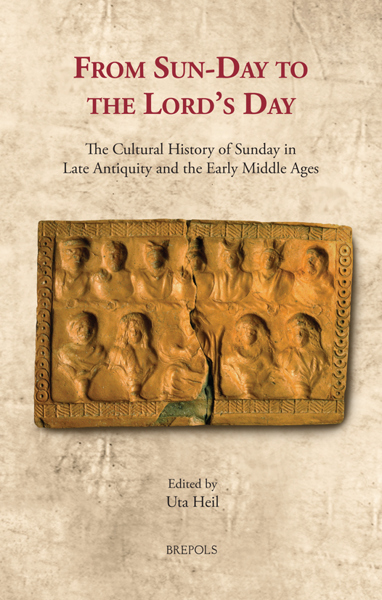From Sun-Day to the Lord’s Day
The Cultural History of Sunday in Late Antiquity and the Early Middle Ages
Uta Heil (ed)
- Pages: approx. 500 p.
- Size:156 x 234 mm
- Illustrations:8 b/w, 2 tables b/w., 1 maps b/w
- Language(s):English, German
- Publication Year:2023 (Feb)
https://www.brepols.net/products/IS-9782503598260-1

SUMMARY
Ever since the Christianization of the planetary week in Late Antiquity, the notion of Sunday as a day of rest, as well as the rhythm of a seven-day week, has been a constant. Yet the cultural history of Sunday in Late Antiquity and the Early Middle Ages is complex. Detailed research reveals a greater diversity than appears at first glance. For example, Sunday did not simply replace the Sabbath, nor was the Jewish Sabbath commandment directly adopted. Furthermore, the Sunday laws of Emperor Constantine officially gave the inhabitants of the Roman Empire a day of rest free of work, but the effect and reception of the laws is hard to grasp, even among Christian authors. Moreover, Sunday was by no means a central theme in the history of late antique Christianity, so that the scattered references must be interpreted.
This edited collection, based on a conference in Vienna in 2019, investigates the relevance of Sunday and the weekly rhythm in Late Antiquity and the Early Middle Ages in the everyday life of people, in monasticism, in synods, in further imperial and ecclesiastical laws, and in disciplinary and liturgical developments. It also covers controversies with the Jewish Sabbath as well as reflections on the aspect of rest, freedom, and of charity. While exploring different views and regional differences, the contributions show the growing importance of the Lord’s Day, especially since the sixth century, as part of the Christianization of society and the sacralization of the calendar.
TABLE OF CONTENTS
From Sun-Day to the Day of the Lord: Introduction — Uta Heil,
Imperial Legislation
Christianisation of the Empire or Power Struggle with Licinius? The Sunday Legislation of Constantine the Great and Its Historical Context — Fritz Mitthof
Missachtung der Sonntagsruhe als Kapitalverbrechen. Einige Bemerkungen zu dem Neufund einer spätantiken Kaiserkonstitution aus Anaia — Uta Heil / Fritz Mitthof
The Emperor Never Rests — Sofie Remijsen
Parting of the Days
Sabbath or Sunday? Rabbis and Church Fathers in Dialogue — Günter Stemberger
Redefining the Sabbath Rest in the Sermons of Augustine: Of Heart, (Re)Quies, and Time — Marie-Ange Rakotoniaina
Structuring of Time
Business as Usual? Sunday Activities in Aphrodito (Egypt, Sixth to Eighth Century AD) [evidence mainly from papyri] — Sofie Remijsen
In Search of Synodical Activities on Sundays — Thomas Graumann
Sunday in Late Antique Arabia and Palestine according to Epigraphy and Hagiography — Basema Hamarneh
The Sunday in Palestinian Monasticism — Andreas Müller
Discipline and Punishment
The Christian Sunday in the Sixth Century: The Sunday Discourse in Politics — Mischa Meier
Hagiography and the Canons on Sunday Work — Ian Wood
Sunday and the Organisation of Freedom in Late Roman Law and Early Medieval Liturgy — Els Rose
Sunday Observance — Norms and Norm Deviation in Late Antiquity — Wolfram Kinzig
Liturgical Celebration
Remarks on Sunday in the Early Church — Michael Durst
Sunday Celebration in the Early Church:A Review of Basic Structures, Characteristic Elements and Significant Developments — Harald Buchinger
Not Every Sunday Is the Same:Observations on the Development of the ‘Sunday propria’ in the Liturgies of the Old Gallican Rite in the Early Middle Ages**— Volker Drecoll**
Propter magna mysteria: Some Observations on Sunday and on Numerology in Walahfrid Strabo’s Handbook — Richard Corradini
***
Register
Sources
Biblical References
Persons and Places